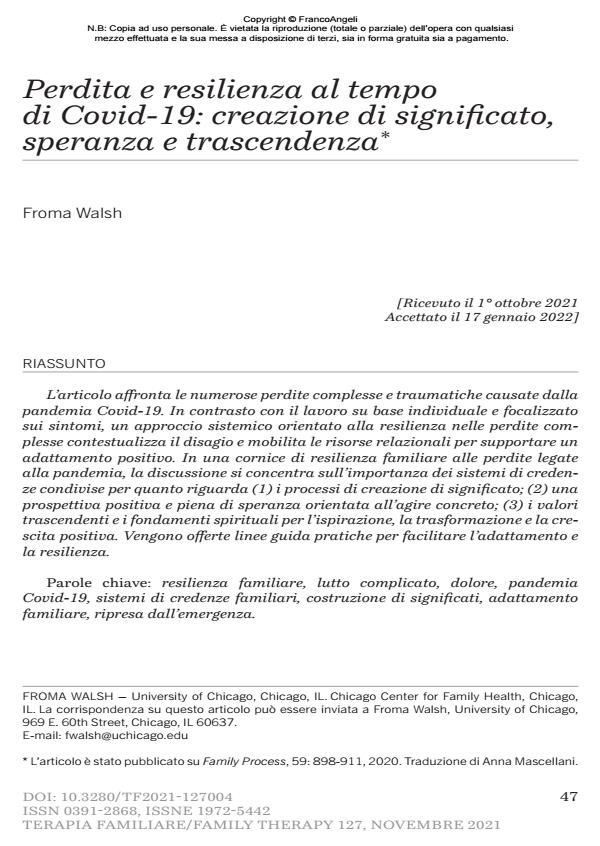Perdita e resilienza al tempo di Covid-19: creazione di significato, speranza e trascendenza
Titolo Rivista TERAPIA FAMILIARE
Autori/Curatori Froma Walsh
Anno di pubblicazione 2022 Fascicolo 2021/127
Lingua Italiano Numero pagine 23 P. 47-69 Dimensione file 713 KB
DOI 10.3280/TF2021-127004
Il DOI è il codice a barre della proprietà intellettuale: per saperne di più
clicca qui
Qui sotto puoi vedere in anteprima la prima pagina di questo articolo.
Se questo articolo ti interessa, lo puoi acquistare (e scaricare in formato pdf) seguendo le facili indicazioni per acquistare il download credit. Acquista Download Credits per scaricare questo Articolo in formato PDF

FrancoAngeli è membro della Publishers International Linking Association, Inc (PILA), associazione indipendente e non profit per facilitare (attraverso i servizi tecnologici implementati da CrossRef.org) l’accesso degli studiosi ai contenuti digitali nelle pubblicazioni professionali e scientifiche.
L’articolo affronta le numerose perdite complesse e traumatiche causate dalla pandemia Covid-19. In contrasto con il lavoro su base individuale e focalizzato sui sintomi, un approccio sistemico orientato alla resilienza nelle perdite complesse contestualizza il disagio e mobilita le risorse relazionali per supportare un adattamento positivo. In una cornice di resilienza familiare alle perdite legate alla pandemia, la discussione si concentra sull’importanza dei sistemi di credenze condivise per quanto riguarda (1) i processi di creazione di significato; (2) una prospettiva positiva e piena di speranza orientata all’agire concreto; (3) i valori trascendenti e i fondamenti spirituali per l’ispirazione, la trasformazione e la crescita positiva. Vengono offerte linee guida pratiche per facilitare l’adattamento e la resilienza.
Parole chiave:Resilienza familiare, lutto complicato, dolore, pandemia Covid-19, sistemi di credenze familiari, costruzione di significati, adattamento familiare, ripresa dall’emergenza.
- Un lunghissimo virus. Effetti a distanza della Pandemia da Covid-19 Antonello D’Elia, in TERAPIA FAMILIARE 129/2022 pp.11
DOI: 10.3280/TF2022-129002
Froma Walsh, Perdita e resilienza al tempo di Covid-19: creazione di significato, speranza e trascendenza in "TERAPIA FAMILIARE" 127/2021, pp 47-69, DOI: 10.3280/TF2021-127004